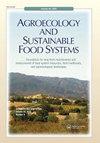以向日葵和迷迭香煎炸油为原料制备油凝胶的研究
IF 2.6
3区 农林科学
Q1 AGRICULTURE, MULTIDISCIPLINARY
Agroecology and Sustainable Food Systems
Pub Date : 2023-07-12
DOI:10.21323/2618-9771-2023-6-2-148-158
引用次数: 0
摘要
本研究的目的是研究以向日葵高油分油和蜡为基础,添加天然复合抗氧化剂——迷迭香提取物和向日葵卵磷脂——作为油炸介质的油凝胶的抗氧化性和功能特性。高含油量的葵花籽油以5%的剂量与葵花籽蜡组成油凝胶。我们进行了研究,以确定用一种基于迷迭香提取物和向日葵卵磷脂的天然抗氧化剂取代200 mg/kg剂量的合成抗氧化剂叔丁基对苯二酚的可能性。结果表明,葵花籽蜡的加入使高油分葵花籽油的诱导期延长了1.6倍,消泡剂和抗氧化剂的加入使高油分葵花籽油的诱导期延长了1.8 ~ 2倍。添加蜡和抗氧剂后,油中氧化产物的积累速率降低,以总极性物质的含量为特征。在无添加剂的油中,热氧化程度最快达到极限值;在油凝胶中,它显著降低。在油中加入葵花籽蜡后,土豆对油的吸收明显减少:在油凝胶中油炸,吸收的油比在没有添加剂的油中油炸少34-38%。在油凝胶中加入0.07%的迷迭香提取物和向日葵卵磷脂,可使煎炸油的操作时间延长至少2倍,与加入叔丁基对苯二酚的油凝胶的操作时间大致相同。这使得用天然迷迭香提取物和向日葵卵磷脂代替油炸油凝胶中的合成抗氧化剂成为可能。开发的油凝胶是一种使用寿命更长的煎炸油,可以让你得到脂肪含量更低的油炸产品。本文章由计算机程序翻译,如有差异,请以英文原文为准。
Study of oleogel based on components Helianthus annuus L. and Rosmarinus officinalis L. as frying oil
The aim of this study was to study the oxidation resistance and functional properties of oleogels based on high oleic oil and wax from Helianthus annuus L. with the addition of a natural complex antioxidant — an extract from Rosmarinus officinalis L. and lecithin from Helianthus annuus L. — when used as a frying medium for French-fries. High oleic sunflower oil was structured into an oleogel with sunflower wax at a dosage of 5%. Studies were carried out to determine the possibility of replacing the synthetic antioxidant tert-butylhydroquinone at a dosage of 200 mg/kg with a natural antioxidant based on rosemary extract and sunflower lecithin in an oleogel with a defoamer. It was determined that the introduction of sunflower wax increased the induction period of high-oleic sunflower oil by 1.6 times, and the additional introduction of defoamer and antioxidants increased this figure by 1.8–2 times. The rate of accumulation of oxidation products in oil, which is characterized by the level of total polar materials, decreased when wax and antioxidants were added. The degree of thermal oxidation most quickly reached the limit value in oil without additives; in oleogels, it significantly decreased. The introduction of sunflower wax into oil contributed to a noticeable decrease in the absorption of oil by potatoes: fried in oleogel, it absorbed 34–38% less oil than fried in oil without additives. The addition of 0.07% rosemary extract with sunflower lecithin to the oleogel increased the operating time of frying oil by at least 2 times, approximately the same as that of the oleogel with tert-butylhydroquinone. This makes it possible to replace the synthetic antioxidant in deepfrying oleogel with natural rosemary extract with sunflower lecithin. The developed oleogel is a frying oil that has a longer service life and allows you to get fried products with a lower amount of fat.
求助全文
通过发布文献求助,成功后即可免费获取论文全文。
去求助
来源期刊

Agroecology and Sustainable Food Systems
AGRICULTURE, MULTIDISCIPLINARY-GREEN & SUSTAINABLE SCIENCE & TECHNOLOGY
CiteScore
4.80
自引率
7.70%
发文量
73
期刊介绍:
Agroecology and Sustainable Food Systems is devoted to the rapidly emerging fields of agroecology and food system sustainability. By linking scientific inquiry and productive practice with transformative social action, agroecology provides a foundation for developing the alternative food systems of the future. The journal focuses on the changes that need to occur in the design and management of our food systems in order to balance natural resource use and environmental protection with the needs of production, economic viability, food security, and the social well-being of all people.
Agroecology and Sustainable Food Systems examines our current food systems from production to consumption, and the urgent need to transition to long-term sustainability. The journal promotes the study and application of agroecology for developing alternatives to the complex problems of resource depletion, environmental degradation, a narrowing of agrobiodiversity, continued world hunger, consolidation and industrialization of the food system, climate change, and the loss of farm land. The journal uses a food systems approach, and seeks experiences in agroecology that are on-farm, participatory, change-oriented, and backed by broad-based methodologies of sustainability analysis and evaluation.
 求助内容:
求助内容: 应助结果提醒方式:
应助结果提醒方式:


